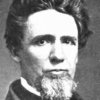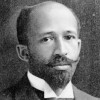As far as your self-control goes, as far goes your freedom.
[So weit Deine Selbstbeherrschung geht, so weit geht Deine Freiheit.]
Marie von Ebner-Eschenbach (1830-1916) Austrian writer
Aphorisms [Aphorismen], No. 534 (1880)
(Source)
(Source (German)). Alternate translation:
Freedom stretches as far as your self-control.
[tr. Scrase/Mieder (1994)]
Quotations about:
freedom
Note not all quotations have been tagged, so Search may find additional quotes on this topic.
DISOBEDIENCE, n. The silver lining to the cloud of servitude.
Ambrose Bierce (1842-1914?) American writer and journalist
“Disobedience,” The Cynic’s Word Book (1906)
(Source)
Included in The Devil's Dictionary (1911). Originally published in the "Devil's Dictionary" column in the San Francisco Wasp (1882-04-02).
For ourselves and for the present, we are safe; our immediate peril is past. But for how long are we safe; and how far have we removed our peril? If our nation could not itself exist half slave and half free, are we sure that it can exist in a world half slave and half free? Is the same conflict less irrepressible when world wide than it was eighty years ago when it was only nation wide? Right knows no boundaries, and justice no frontiers; the brotherhood of man is not a domestic institution.
Learned Hand (1872-1961) American jurist
“A Pledge of Allegiance,” speech, Central Park, New York City (1945-05-20)
(Source)
His second "I Am an American Day" address. Collected in The Spirit of Liberty (1953).
Yet they, believe me, who await
No gifts from chance, have conquered fate.Matthew Arnold (1822-1888) English poet and critic
“Resignation,” The Strayed Reveller and Other Poems (1848)
(Source)
When you take the wires of the cage apart, you do not hurt the bird, but help it. You let it out of its prison. How do vou know that death does not help me when it takes the wires of my cage down? — that it does not release me, and put me into some better place, and better condition of life?
Randolph S. Foster (1820-1903) American Methodist Episcopal bishop, preacher, educator
“Man a Spiritual Being,” Lecture 2, Chautauqua, New York (1878)
(Source)
Collected in his Beyond the Grave: Being Three Lectures Before Chautauqua Assembly in 1878 (1879).
Nationality is a Janus, facing both ways. So far as it stands for the right of a people to govern itself, it stands for freedom. So far as it stands for the ambition to govern other people, or to destroy them, or to shape them into an alien world, it stands for domination. Throughout history it has stood for both.
G. Lowes Dickinson (1862-1932) British political scientist and philosopher [Goldsworthy "Goldie" Lowes Dickinson]
“The War and the Way Out: A Further Consideration,” sec. 3, Atlantic Monthly (1915-04)
(Source)
The other threat to the security of our tradition, I believe, lies at home. It is the current fear of radical ideas and of people who propound them. I do not agree with extremists of either the left or the right, but I think they should be allowed to speak and to publish, both because they themselves have, and ought to have, rights, and once their rights are gone, the rights of the rest of us are hardly safe.
Jane Jacobs (1916-2006) American-Canadian journalist, author, urban theorist, activist
“No Virtue in Meek Conformity” (1952)
(Source)
Foreword to her response to a State Department Loyalty Security Board interrogatory (1952-03-25). Reprinted in Vital Little Plans (2016).
Perish all they who love to dwell in cities
subject to Kings, or to the mighty few,
For Freedom’s an invaluable name,
and he who hath but little, here is rich.[κακῶς δ’ ὄλοιντο πάντες οἳ τυραννίδι
χαίρουσιν ὀλίγῃ τ’ ἐν πόλει μοναρχίᾳ·
τοὐλεύθερον γὰρ ὄνομα παντὸς ἄξιον,
κἂν σμίκρ’ ἔχῃ τις, μεγάλ’ ἔχειν νομιζέτω.]Euripides (485?-406? BC) Greek tragic dramatist
Auge [Αὐγῃ], fr. 275 (TGF) (c. 408 BC) [tr. Wodhall (1809)]
(Source)
Nauck frag. 275, Barnes frag. 10, Musgrave frag. 7. (Source (Greek)). Alternate translations:
Pray that all who rejoice in tyranny,
Or in some small monarchy in their city, die terribly.
The name "freedom" is worth everything --
Even if he possesses a little, a man who has this is considered great.
[@sententiq (2015)]
Worth above all is a name fit for the free.
[Source]
I was brought up to believe that there is no virtue in conforming meekly to the dominant opinion of the moment. I was encouraged to believe that simple conformity results in stagnation for a society, and that American progress has been largely owing to the opportunity for experimentation, the leeway given initiative, and to a gusto and a freedom for chewing over odd ideas. I was taught that the American’s right to be a free individual, not at the mercy of the state, was hard-won and that its price was eternal vigilance, and that I too would have to be vigilant. I was made to feel that it would be a disgrace to me, as an individual, if I should not value or should give up rights that were dearly bought.
Jane Jacobs (1916-2006) American-Canadian journalist, author, urban theorist, activist
“No Virtue in Meek Conformity” (1952)
(Source)
Foreword to her response to a State Department Loyalty Security Board interrogatory (1952-03-25). Reprinted in Vital Little Plans (2016).
A wise man neither lets himself be governed nor seeks to govern others: he wishes reason alone to govern, and for ever.
[Un homme sage ni ne se laisse gouverner, ni ne cherche à gouverner les autres: il veut que la raison gouverne seule et toujours.]
Jean de La Bruyère (1645-1696) French essayist, moralist
The Characters [Les Caractères], ch. 4 “Of the Heart [Du Coeur],” § 71 (4.71) (1688) [tr. Stewart (1970)]
(Source)
(Source (French)). Alternate translations:
A Wise Man neither suffers himself to be govern'd, nor attempts to govern others. 'Tis his reason alone which always governs him.
[Bullord ed. (1696)]
A Wise Man neither suffers himself to be govern'd, nor attempts to govern others. He wou'd have Reason alone always to govern him.
[Curll ed. (1713)]
An intelligent man neither allows himself to be controlled nor attempts to control others; he wishes reason alone to rule, and that always.
[tr. Van Laun (1885)]
There are some men who listen neither to reason nor to good advice, and who deliberately go astray through fear of being dominated.
[Il se trouve des hommes qui n’écoutent ni la raison ni les bons conseils, et qui s’égarent volontairement par la crainte qu’ils ont d’être gouvernés.]
Jean de La Bruyère (1645-1696) French essayist, moralist
The Characters [Les Caractères], ch. 4 “Of the Affections [Du Coeur],” § 71 (4.71) (1688) [tr. Stewart (1970)]
(Source)
(Source (French)). Alternate translations:
There are those men who will not hearken to reason, or good council, but deviate of their own Heads, purely for fear of being govern'd.
[Bullord ed. (1696)]
There are some Men who will not hearken to Reason and good Counsel, but deviate of their own Heads, purely for fear of being govern'd.
[Curll ed. (1713)]
There are some Men who turn the deaf Ear to Reason and friendly Counsel, and play the Fool of their own Heads, purely for fear of being governed.
[Browne ed. (1752)]
There are some men who turn a deaf ear to reason and good advice, and willfully go wrong for fear of being controlled.
[tr. Van Laun (1885)]
The superstition into which we’re born,
Even when we recognize it, loses not
Its power on us! Not all those are free
Who ridicule their chains.[Der Aberglaub’, in dem wir aufgewachsen,
Verliert, auch wenn wir ihn erkennen, darum
Doch seine Macht nicht über uns. — Es sind
Nicht alle frei, die ihrer Ketten spotten.]Gotthold Lessing (1729-1781) German playwright, philosopher, dramaturg, writer
Nathan the Wise [Nathan der Weise], Act 4, sc. 4 [Templar] (1779) [tr. Corbett (1883)]
(Source)
(Source (German)). Alternate translations:
Yet the superstition
in which we have grown up, not therefore loses
when we detect it, all its influence on us.
Not all are free that can bemock their fetters.
[tr. Taylor (1790)]
The superstition in which we grew up,
Does not cease influencing us, e'en after
We have discover'd its absurdity.
Not all are free who do bemock their fetters.
[tr. Reich (1860)]
The superstition in which we were brought up never loses its power over us, even after we understand it.
[Source (1866)]
And yet the superstitions we have learned
From education, do not lose their power
When we have found them out; nor are all free
Whose judgment mocks the galling chains they wear.
[tr. Boylan (1878)]
The superstition in which we have grown up
Does not lose (even if we see through it)
Its power on us, on that account;
All are not free who mock their chains.
[tr. Jacks (1894)]
The superstitions of our early years,
E'en when we know them to be nothing more,
Lose not for that their hold upon our hearts;
Not all are free who ridicule their chains.
[tr. Maxwell (1917)]
The superstition in which we have grown up does not lose its power over us even for the reason that we recognize it as such. Not all are free who mock their chains.
[tr. Reinhardt (1950)]
The superstition in which we grew up,
Though we may recognize it, does not lose
Its power over us -- Not all are free
Who make mock of their chains.
[tr. Morgan (1955)]
Merely because we see the defects of the superstition we grew up in, it doesn't lose its hold upon our souls! Those men who mock their chains are not all free!
[tr. Ade (1972)]
Liberty trains for liberty. Responsibility is the first step in responsibility.
W. E. B. Du Bois (1868-1963) American writer, historian, social reformer [William Edward Burghardt Du Bois]
John Brown, ch. 13 “The Legacy of John Brown” (1909)
(Source)
On the policy among white colonial powers that non-whites "ought to be under the restraint and benevolent tutelage of stronger and wiser nations for their own benefit," until they are "capable" of being free.
No form of liberty is worth a darn which doesn’t give us the right to do wrong now and then.
H. L. Mencken (1880-1956) American writer and journalist [Henry Lewis Mencken]
A Little Book in C Major, ch. 3, § 16 (1916)
(Source)
A wise woman once said to me that there are only two lasting bequests we can hope to give our children. One of these she said is roots, the other, wings.
Hodding Carter II (1907-1972) American journalist and author [William Hodding Carter II]
Where Main Street Meets the River, “It’s How We Like It” (1953)
(Source)
Almost always quoted without the notes about the "wise woman," e.g.,
There are only two lasting bequests we can hope to give our children: one of these is roots, the other, wings.
On the necessary points, unity. On the questionable points, liberty. In everything, love.
Augustine of Hippo (354-430) Christian church father, philosopher, saint [b. Aurelius Augustinus]
(Misattributed)
A commentary on theological / doctrinal dispute, frequently attributed to Augustine, but not found in his works.
The first known occurrence of such an expression is in Marco Antonio de Dominis, De Republica Ecclesiastica, Book 4, ch. 8, penultimate sentence (1617):
Omnesque mutuam amplecteremur unitatem in necessariis, in non necessariis libertatem, in omnibus caritatem.
[And let us all embrace one another, unity in what is necessary, liberty in what is not necessary, charity in all things.]
The phrase was also adapted by Richard Baxter (1615-1691) as his motto. See also Rupertus Meldenius (1626).
More discussion about this quotation here: Liber locorum communium: In necessariis unitas, in non necessariis libertas, in utrisque caritas (Marco Antonio De Dominis, 1617), cf. In necessariis unitas, in dubiis libertas, in omnibus caritas (and other variants). English: "In essentials unity ..."
For Freedom’s battle once begun,
Bequeathed by bleeding Sire to Son,
Though baffled oft is ever won.
We are neither “warmongers” nor “appeasers,” neither “hard” nor “soft.” We are Americans, determined to defend the frontiers of freedom, by an honorable peace if peace is possible, but by arms if arms are used against us. And if we are to move forward in that spirit, we shall need all the calm and thoughtful citizens that this great University can produce, all the light they can shed, all the wisdom they can bring to bear. It is customary, both here and around the world, to regard life in the United States as easy. Our advantages are many. But more than any other people on earth, we bear burdens and accept risks unprecedented in their size and their duration, not for ourselves alone but for all who wish to be free.
John F. Kennedy (1917-1963) US President (1961-63)
Speech, Centennial Celebration, University of Washington, Seattle (1961-11-16)
(Source)
We want perfection in other people, and yet we do not put right our own failings. We want to see others firmly corrected, but we refuse correction ourselves. We take offence when permission is given to others, but we do not want our own requests refused. We want rules to check the activities of others, but we are indignant at restrictions on ourselves.
[Libenter videmus alios perfectos, sed tamen proprios non emendamus defectus. Volumus quod alii districte corrigantur, et nos ipsi corrigi nolumus, aut negari quod petimus. Alios restringi per statuta volumus, et ipsi nullatenus patimur amplius cohiberi.]
Thomas à Kempis (c. 1380-1471) German-Dutch priest, author
The Imitation of Christ [De Imitatione Christi], Book 1, ch. 16, v. 2ff (1.16.2-3) (c. 1418-27) [tr. Knott (1962)]
(Source)
(Source (Latin)). Alternate translations:
We would gladly have others perfect, but will not amend our own defaults. We would that others should be straitly corrected for their offences, but we will not be corrected. It misliketh us that others have liberty, but we will not be denied of that we ask. We would also that others should be restrained according to the statutes, but we in nowise will be restrained.
[tr. Whitford/Raynal (1530/1871)]
We would gladly have others perfect, yet we will not amend our own faults. We desire others to be strictly corrected for their offenses, yet we will not be corrected. We dislike it that others have liberty, yet we will not be denied what we ask. We desire that others should be restrained according to the laws, yet we will in no way be restrained.
[tr. Whitford/Gardiner (1530/1955)]
It is injustice to expect that in another which thou hast not in thy self, to looke for perfection in others, and yet not to amend imperfections in our selves. We will have others severely punisht, and will not amend our selves; the large liberty of others disliketh us, and yet we will not have our desires deni'd us, we will have rigorous Lawes imposed upon others, but in no sort will we our selves be restrained.
[tr. Page (1639), 1.16.8-9]
And, indeed, nothing is more common, than to express exceeding Zeal in amending our Neighbours, and mighty Indignation against Their Vices or Imperfections, while at the same time we neglect the beginning at Home, and either quite overlook, or seem highly contented with our own. We set up for Reformers, declaim at the Wickendess of the Age, and are all for suppressing and punishing it by vigorous Laws; and yet are unwilling that any Check or Restraint should be put upon our own Freedoms.
[tr. Stanhope (1696; 1706 ed.)]
But we require perfection in the rest of mankind, and take no care to rectify the disorders of our own heart; we desire that the faults of others should be severely punished, and refuse the gentlest correction ourselves; we are offended at their licentiousness, and yet cannot bear the least opposition to our own immoderate desires. We would subject all to the control of rigorous statute and penal laws, but will not suffer any restraint upon our own actions.
[tr. Payne (1803), 1.16.3]
We would willingly have others perfect, and yet we amend not our own faults. We will have others severely corrected, and will not be corrected ourselves. The large liberty of others displeaseth us; and yet we will not have our own desires denied us. We will have others kept under by strict laws; but in no sort will ourselves be restrained.
[ed. Parker (1841)]
We willingly require perfection in the rest of mankind, and yet do not rectify the disorders of our own hearts. We desire that the faults of others should be severely punished, and refuse the gentlest correction ourselves. We are offended at their licentiousness, and yet cannot bear the least denial of our own immoderate desires. We would subject all to the control of rigorous statutes, but suffer no restraint upon our own action.
[tr. Dibdin (1851)]
We would fain have others perfect, and yet we amend not our own defects. We would have others strictly corrected, but will not be corrected ourselves. The large liberty of others displeases us, and yet we would not be denied anything we ask for. We wish others to be bound down by laws, and we suffer ourselves to be in no sort restrained.
[ed. Bagster (1860)]
We are ready to see others made perfect, and yet we do not amend our own shortcomings. We will that others be straitly corrected, but we will not be corrected ourselves. The freedom of others displeaseth us, but we are dissatisfied that our own wishes shall be denied us. We desire rules to be made restraining others, but by no means will we suffer ourselves to be restrained.
[tr. Benham (1874)]
We are desirous to have others perfect, and yet we amend not our own faults. We will have others severely corrected, and will not be corrected ourselves. The large liberty of others displeaseth us; and yet we will not have our own desires denied us. We will have others kept under by strict laws; but in no sort will we ourselves be restrained.
[tr. Anon. (1901)]
We want them to be perfect, yet we do not correct our own faults. We wish them to be severely corrected, yet we will not correct ourselves. Their great liberty displeases us, yet we would not be denied what we ask. We would have them bound by laws, yet we will allow ourselves to be restrained in nothing.
[tr. Croft/Bolton (1940)]
We would readily have others perfect and yet not amend our own defects. We want others rigidly corrected and are unwilling to be corrected ourselves. The wide freedom of others displeases us, and yet we would not be denied whatever we ask. We wish others to be bound by rules, and will ourselves in no way be held in.
[tr. Daplyn (1952)]
For we require other people to be perfect, but do not correct our own faults. We wish to see others severely reprimanded; yet we are unwilling to be corrected ourselves. We wish to restrict the liberty of others, but are not willing to be denied anything ourselves. We wish others to be bound by rules, yet we will not let ourselves be bound.
[tr. Sherley-Price (1952)]
We like to have everybody around us quite perfect, but our own faults -- we never seem to correct them. Tom, Dick and Harry must be strictly called to order, but we aren't fond of being called to order ourselves. It is always the other man that has too much rope given him -- our wishes must not be thwarted; rules for everybody else, but our own liberties must not be abridged for a moment.
[tr. Knox-Oakley (1959), 1.16.3]
Though quick to expect perfection in others, we take little care to correct our own shortcomings. We wouidl have others strictly corrected, but not ourselves. The wide freedom of others displeases us, yet we wish to be denied nothing that we ourselves desire. We would have others under the restraint of the rule while unwilling ourselves to be under any sort of restraint.
[tr. Rooney (1979)]
We would willingly have others be perfect, and yet we fail to correct our own faults. We want others to be strictly corrected, and yet we are unwilling to be corrected ourselves. Other peoples' far-ranging freedom annoys us, and yet we insist on having our own way. We wish others to be tied down by rules, and yet we will not allow ourselves to be held in check in any way at all.
[tr. Creasy (1989)]
The United States is not a beacon, not a light of freedom! She is a warning, rather than an example to the world!
Lydia Maria Child (1802-1880) American abolitionist, activist, journalist, suffragist
Speech, Massachusetts Anti-Slavery Society 25th Anniversary Conference (1857)
(Source)
On slavery in the US, two months before the Dredd Scott decision.
Almost always elided as "The United States ... is a warning, rather than example to the world."
Liberal learning is both a safeguard against false ideas of freedom and a source of true ones.
Whitney Griswold (1906–1963) American historian, educator [Alfred Whitney Griswold]
“Freedom, Security, and the University Tradition,” speech, Columbia University Bicentennial (1954-06-02)
(Source)
Reprinted in Griswold, In the University Tradition (1957).
Quoted by John F. Kennedy in a speech at Yale University (1962-06-11). Citations of Kennedy for the quote are far more common than for Griswold's original.
That man’s best works should be such bungling imitations of Nature’s infinite perfection, matters not much; but that he should make himself an imitation, this is the fact which Nature moans over, and deprecates beseechingly. Be spontaneous, be truthful, be free, and thus be individuals! is the song she sings through warbling birds, and whispering pines, and roaring waves, and screeching winds.
Lydia Maria Child (1802-1880) American abolitionist, activist, journalist, suffragist
Letters from New-York, # 38, 1843-03-17 (1843)
(Source)
To do good to mankind is the chivalrous plan,
And is always as nobly requited;
Then battle for freedom wherever you can.
And, if not shot or hang’d, you’ll get knighted.
The First Amendment is truly the heart of the Bill of Rights. The Framers balanced its freedoms of religion, speech, press, assembly and petition against the needs of a powerful central government, and decided that in those freedoms lies this nation’s only true security. They were not afraid for men to be free. We should not be.
Hugo Black (1886-1971) American politician and jurist, US Supreme Court Justice (1937-71)
James Madison Lecture, NYU School of Law (1960-02-17)
(Source)
The inaugural Madison lecture. Reprinted as "The Bill of Rights," NYU Law Review, Vol. 35 (1960-04).
Since the earliest days, philosophers have dreamed of a country where the mind and spirit of man would be free; where there would be no limits to inquiry; where men would be free to explore the unknown and to challenge the most deeply rooted beliefs and principles. Our First Amendment was a bold effort to adopt this principle — to establish a country with no legal restrictions of any kind upon the subjects people could investigate, discuss, and deny.
Hugo Black (1886-1971) American politician and jurist, US Supreme Court Justice (1937-71)
James Madison Lecture, NYU School of Law (1960-02-17)
(Source)
The inaugural Madison lecture. Reprinted as "The Bill of Rights," NYU Law Review, Vol. 35 (Apr 1960)
I would rather go to hell by choice than to stumble into heaven by following the crowd.
Benjamin Mays (1894-1984) American minister, educator, civil rights leader
(Attributed)
Stories of our women leaving home to frisk
in mock ecstasies among the thickets on the mountain,
dancing in honor of the latest divinity,
a certain Dionysus, whoever he may be!
In their midst stand bowls brimming with wine.
And then, one by one, the women wander off
to hidden nooks where they serve the lusts of men.
Priestesses of Bacchus they claim they are,
but it’s really Aphrodite they adore.[γυναῖκας ἡμῖν δώματ᾽ ἐκλελοιπέναι
πλασταῖσι βακχείαισιν, ἐν δὲ δασκίοις
ὄρεσι θοάζειν, τὸν νεωστὶ δαίμονα
Διόνυσον, ὅστις ἔστι, τιμώσας χοροῖς:
πλήρεις δὲ θιάσοις ἐν μέσοισιν ἑστάναι
κρατῆρας, ἄλλην δ᾽ ἄλλοσ᾽ εἰς ἐρημίαν
πτώσσουσαν εὐναῖς ἀρσένων ὑπηρετεῖν,
πρόφασιν μὲν ὡς δὴ μαινάδας θυοσκόους,
τὴν δ᾽ Ἀφροδίτην πρόσθ᾽ ἄγειν τοῦ Βακχίου.]Euripides (485?-406? BC) Greek tragic dramatist
Bacchæ [Βάκχαι], l. 217ff [Pentheus/Πενθεύς] (405 BC) [tr. Arrowsmith (1960)]
(Source)
(Source (Greek)). Alternate translations:
Their homes
Our women have deserted, on pretence
That they in mystic orgies are engaged;
On the umbrageous hills they chant the praise
Of this new God, whoe'er he be, this Bacchus;
Him in their dances they revere, and place
Amid their ranks huge goblets fraught with wine:
Some fly to pathless deserts, where they meet
Their paramours, while they in outward shew
Are Mænedes by holy rites engrossed.
Yet Venus more than Bacchus they revere.
[tr. Wodhull (1809)]
The women have left our homes in contrived Bacchic rites, and rush about in the shadowy mountains, honoring with dances this new deity Dionysus, whoever he is. I hear that mixing-bowls stand full in the midst of their assemblies, and that they each creep off different ways into secrecy to serve the beds of men, on the pretext that they are Maenads worshipping; but they consider Aphrodite before Bacchus.
[tr. Buckley (1850)]
Our women all have left their homes, to join
These fabled mysteries. On the shadowy rocks
Frequent they sit, this God of yesterday,
Dionysus, whosoe'er he be, with revels
Dishonorable honoring. In the midst
Stand the crowned goblets; and each stealing forth,
This way and that, creeps to a lawless bed;
In pretext, holy sacrificing Mænads,
But serving Aphrodite more than Bacchus.
[tr. Milman (1865)]
Our women have deserted from their homes,
Pretending Bacchic rites, and now they lurk
In the shady hill-tops reverencing forsooth
This Dionysus, this new deity.
Full bowls of wine are served out to the throng;
And scattered here and there through the glades,
The wantons hurry to licentious love.
They call themselves the priestess Mænades;
Bacchus invoke, but Aphrodite serve.
[tr. Rogers (1872), l. 200ff]
I hear that our women-folk have left their homes on pretence of Bacchic rites, and on the wooded hills rush wildly to and fro, honouring in the dance this new god Dionysus, whoe’er he is; and in the midst of each revel-rout the brimming wine-bowl stands, and one by one they steal away to lonely spots to gratify their lust, pretending forsooth that they are Mænads bent on sacrifice, though it is Aphrodite they are placing before the Bacchic god.
[tr. Coleridge (1891)]
How from their homes our women have gone forth
Feigning a Bacchic rapture, and rove wild
O'er wooded hills, in dances honouring
Dionysus, this new God -- whoe'er he be.
And midst each revel-rout the wine-bowls stand
Brimmed: and to lonely nooks, some here, some there,
They steal, to work with men the deed of shame,
In pretext Maenad priestesses, forsooth,
But honouring Aphroditê more than Bacchus.
[tr. Way (1898)]
Our own
Wives, our own sisters, from their hearths are flown
To wild and secret rites; and cluster there
High on the shadowy hills, with dance and prayer
To adore this new-made God, this Dionyse,
Whate'er he be! -- And in their companies
Deep wine-jars stand, and ever and anon
Away into the loneliness now one
Steals forth, and now a second, maid or dame,
Where love lies waiting, not of God! The flame,
They say, of Bacchios wraps them. Bacchios! Nay,
'Tis more to Aphrodite that they pray.
[tr. Murray (1902)]
That our women have abandoned their homes
in fake bacchic revels, and in the deep-shaded
mountains are roaming around, honoring with dances
the new-made god Dionysus, whoever he is;
that wine-bowls are set among the sacred companies
full to the brim, and that one by one the women go crouching
into the wilderness, to serve the lechery of men --
they profess to be maenads making sacrifice,
but actually they put Aphrodite before the Bacchic god.
[tr. Kirk (1970)]
Our women, I discover, have abandoned their homes on some pretence of Bacchic worship, and go gadding about in the woods on the mountain side, dancing in honour of this upstart god Dionysus, whoever he may be. They tell me, in the midst of each group of revellers stands a bowl full of wine; and the women go creeping off this way and that to lonely places and there give themselves to lecherous men, under the excuse that they are Maenad priestesses; though in their ritual Aphrodite comes before Bacchus.
[tr. Vellacott (1973)]
They leave their home, desert their children
Follow the new fashion and join the Bacchae
Flee the hearth to mob the mountains -- those contain
Deep shadows of course, secret caves to hide
Lewd games for this new god -- Dionysos!
That's the holy spirit newly discovered.
Dionysos! Their ecstasy is flooded down
In brimming bowls of wine -- so much for piety!
Soused, with all the senses roused, they crawl
Into the bushes and there of course a man
Awaits them. All part of the service for for this
Mysterious deity. The hypocrisy? All they care about
Is getting serviced.
[tr. Soyinka (1973)]
Our women gone, abandoning their homes,
pretending to be bacchae, massing
in the bushy mountains, this latest divinity
Dionysos (whoever he is) honouring and chorusing,
filling and setting amidst the thiasus
wine-bowls, and one by one in solitude
sneaking off to cater to male bidding, --
supposedly as sacrificial maenads,
but Aphrodite ranks before their Bacchic One.
[tr. Neuburg (1988)]
Our women, I am told, have left their homes,
in a religious trance -- what travesty! --
and scamper up and down the wooded mountains, dancing
in honor of this newfangled God, Dionysus,
whoever he might be.
In the middle of each female group
of revelers, I hear,
stands a jar of wine, brimming! And that taking turns,
they steal away, one here, one there, to shady nooks,
where they satisfy the lechery of men,
pretending to be priestesses,
performing their religious duties. Ha!
That performance reeks more of Aphrodite than of Bacchus.
[tr. Cacoyannis (1982)]
Our women have abandoned our homes
And, in a jacked-up frenzy of phony inspiration,
Riot in the dark mountains,
Honoring this upstart god, Dionysos --
Whatever he is -- dancing in his chorus.
Full jugs of wine stand in their midst
And each woman slinks off
To the wilderness to serve male lust,
Pretending they are praying priestesses,
But Aphrodite leads them, not Bacchus.
[tr. Blessington (1993)]
Our women have abandoned their homes
for the sham revelries of Bacchus
frisking about on the dark-shadowed mountains
honoring with their dances the latest god, Dionysius, whoever he is.
They've set up their mixing bowls brimming with wine
amidst their cult gatherings, and each lady slinks off in a different direction
to some secluded wilderness to service the lusts of men.
They pretend to be maenads performing sacrifices
but in reality they rank Aphrodite's pleasures before Bacchus!
[tr. Esposito (1998)]
These women of ours have left their homes
and run away to the dark mountains, pretending
to be Bacchants. It's this brand-new god,
Dionysus, whoever that is; they're dancing for him!
They gather in throngs around full bowls
of wine; then one by one they sneak away
to lonely places where they sleep with men.
Priestesses they call themselves! Maenads!
It's Aphrodite they put first, not Bacchus.
[tr. Woodruff (1999)]
Women leave
Our houses for bogus revels (“Bakkhic” indeed!),
Dashing through the dark shade of mountain forests
To honor with their dancing this new god,
Dionysos -- whoever he may be --
And right in their midst they set full bowls of wine,
And slink into the thickets to meet men there,
Saying they are maenads sacrificing
When they really rank Aphrodite first,
Over Bakkhos!
[tr. Gibbons/Segal (2000)]
The women have left our homes in fictitious ecstatic rites and flit about on the thick-shaded mountains, honoring the new god Dionysus, whoever he is, with their dancing. They set up full wine bowls in the middle of their assembles and sneak off, one here, one there, to tryst in private with men. The pretext for all of this is that they are maenads, performing their rites, but they hold Aphrodite in higher regard than the bacchic god.
[tr. Kovacs (2002)]
I hear our women have flown from their proper place in the home -- dancing about in the shadowy hills in sham ecstasy for this newfound Dionysus! And these wine-befuddled women slink into the darkness, drawn by the sirens of lust. Fine high priestesses of the new god! They seem to make more worship of Aphrodite than of Bacchus!
[tr. Rao/Wolf (2004)]
I heard that our women have left their homes and gone off to the mountains dancing the Bacchic dances! Some new, young god! Utter rubbish! There they are, placing great tubs full of wine in the centre of their group, in the middle of nowhere and off they go, one here, another there, rolling around with any man they come across and giving the excuse that they are maenads; but what are they doing? Serving Dionysos? No way! They’re serving Aphrodite!
[tr. Theodoridis (2005)]
The women have left us, abandoning their homes in
phony Bacchic worship and that they gad about on
the bushy mountaintops; that this "new" god Dio-
nysus, whoever he really is, is honoured in their dances,
and that they set the sacred wine-bowls, fill'd, in the
midst of the thiasoi, each slinking off her sep'rate
way to serve males' hot lust in the woods, pre-
tending to be Maenads sacrificing; and so
they place Aphrodite on top of Bacchus.
[tr. Valerie (2005)]
... women leaving home
to go to silly Bacchic rituals,
cavorting there in mountain shadows,
with dances honoring some upstart god,
this Dionysus, whoever he may be. Mixing bowls
in the middle of their meetings filled with wine,
they creep off one by one to lonsely spots
to have sex with men, claiming they're Maenads
busy worshipping. But they rank Aphrodite,
goddess of sexual desire, ahead of Bacchus.
[tr. Johnston (2008), l. 272ff]
Women have deserted their homes for these
fraudulent rites -- up in the woods and mountains,
dancing to celebrate some new god --
Dionysus, whoever he is.
Drink is at the bottom of it all.
Huge bowls stand in their midst, I'm told,
brimming with wine, and one by one the women
slip into the shadows to satisfy the lusts of men.
They say they are priestesses, sworn to Bacchus,
but it's clearly Aphrodite they adore.
[tr. Robertson (2014)]
Women have forsaken their homes. It’s a front, it’s a fake, a false Bacchic rite, an excuse for them to cavort in the mountain’s shade, dancing to honor this "new god" Dionysus.
Whoever that is. Whoever he really is.
I hear they’ve got casks of wine up there, full to the brim, just sitting there in the midst of their frolicking. And that they sneak off into secluded corners, servicing men, excusing it as a sacred thing, a Maenad’s ritual.
If it is a ritual, it’s to Aphrodite, not this Bacchus of theirs.
[tr. Pauly (2019)]
How our women
had run off
to celebrate
perferse rites
in the mountains,
roaming about with this
brand new god, Dionysus --
whoever he is.
Everywhere
in the midst of their revels
stand full wine bowls.
And women slink off
one by one
to copulate
with any man
who happens by.
They pretend to be Maenads, priestesses.
It's Aphrodite,
not Bacchus,
they worship.
[tr. Behr/Foster (2019)]
Our women have left our homes in contrived Bacchic rites, and rush about in the shadowy mountains, honoring with khoroi this new daimōn Dionysus, whoever he is. I hear that mixing-bowls stand full in the midst of their assemblies, and that each woman, flying to secrecy in different directions, yields to the embraces of men, on the pretext that they are Maenads worshipping. They consider Aphrodite of greater priority than Dionysus.
[tr. Buckley/Sens/Nagy (2020)]
In any country, regardless of what its laws say, wherever people act upon the idea that the disadvantage of one man is the good of another, there slavery exists. Wherever, in any country the whole people feel that the happiness of all is dependent upon the happiness of the weakest, there freedom exists.
Booker T. Washington (1856-1915) American educator, writer
Speech, Republican Club, New York City (12 Feb 1909)
(Source)
Freedom is more precious than any gifts for which you may be tempted to give it up.
[Más preciosa es la libertad que la dádiva, porque se pierde.]
Baltasar Gracián y Morales (1601-1658) Spanish Jesuit priest, writer, philosopher
The Art of Worldly Wisdom [Oráculo Manual y Arte de Prudencia], § 286 (1647) [tr. Jacobs (1892)]
(Source)
(Source (Spanish)). Alternate translations:
Liberty is more precious than all gifts: and to receive, is to lose it.>br?
[Flesher ed. (1685)]Independence is more precious, than any gift for which you might forfeit it.
[tr. Fischer (1937)]
Freedom is more precious then the gift that makes us lose it.
[tr. Maurer (1992)]
All of us are infected today with an extraordinary egoism. And that is not freedom; freedom means learning to demand only of oneself, not of life and others, and knowing how to give: sacrifice in the name of love.
Andrei Tarkovsky (1932-1986) Russian film director, screenwriter, film theorist [Андрей Арсеньевич Тарковский]
Sculpting in Time (1986) [tr. Hunter-Blair]
(Source)
Science and religion are two human enterprises sharing many features. They share these features also with other enterprises such as art, literature and music. The most salient features of all these enterprises are discipline and diversity. Discipline to submerge the individual fantasy in a greater whole. Diversity to give scope to the infinite variety of human souls and temperaments. Without discipline there can be no greatness. Without diversity there can be no freedom. Greatness for the enterprise, freedom for the individual — these are the two themes, contrasting but not incompatible, that make up the history of science and the history of religion.
Freeman Dyson (1923-2020) English-American theoretical physicist, mathematician, futurist
Infinite in All Directions, Part 1, ch. 1 “In Praise of Diversity” (1988)
(Source)
Based on a lecture on "Science and Religion," National Conference of Catholic Bishops, Detroit (Sep 1986).
I have begun in old age to understand just how oddly we are all put together. We are so proud of our autonomy that we seldom if ever realize how generous we are to ourselves, and just how stingy with others. One of the booby traps of freedom — which is bordered on all sides by isolation — is that we think so well of ourselves. I now see that I have helped myself to the best cuts at life’s banquet.
Civilization is the progress toward a society of privacy. The savage’s whole existence is public, ruled by the laws of his tribe. Civilization is the process of setting man free from men.
Ayn Rand (1905-1982) Russian-American writer, philosopher
The Fountainhead, ch. 18 [Roark] (1943)
(Source)
Let the rigour of a master over his slaves be applied by those who hold men under the empire of oppression; but they who rule by the principle of fear in a free state, practice a system of unparalleled madness. […] Let us therefore embrace that mode of conduct which has the most extensive influence, which contributes most, not only to the safety, but to the increase of wealth and power, and which rests, not upon fear, but upon the continuation of kind affections. — This is the method by which not only in private, but in public, we shall most easily obtain what we desire.
[Sed iis, qui vi oppresses imperio coercent, sit sane adhibenda saevitia, ut eris in famulos, si aliter teneri non possunt; qui vero in libera civitate ita se instruunt, ut metuantur, iis nihil potest esse dementius. […] Quod igitur latissime patet neque ad incolumitatem solum, sed etiam ad opes et potentiam valet plurimum, id amplectamur, ut metus absit, caritas retineatur. Ita facillime, quae volemus, et privatis in rebus et in re publica consequemur.]
Marcus Tullius Cicero (106-43 BC) Roman orator, statesman, philosopher
De Officiis [On Duties; On Moral Duty; The Offices], Book 2, ch. 7 (2.7) / sec. 24 (44 BC) [tr. McCartney (1798)]
(Source)
(Source (Latin)). Alternate translations:
It is well enough in those who by open force have reduced any nation, and accordingly rule it with a high hand, if they do sometimes use rigour and severity, like masters towards their slaves when there is no other way of holding them in subjection: but for those who are magistrates in a free city, to endeavour to make themselves feared by the people, is one of the maddest and most desperate attempts on the face of the earth. [...] Let us therefore embrace and adhere to that method which is of the most universal influence, and serves not only to secure us what we have, but moreover to enlarge our power and authority; that is, in short, let us rather endeavour to be loved than feared, which is certainly the best way to make us successful, as well in our private as our public business.
[tr. Cockman (1699)]
But the truth is, cruelty must be employed by those who keep others in subjection by force; as by a master to his slaves, if they cannot otherwise be managed. But of all madmen, they are the maddest who, in a free state so conduct themselves as to be feared. [...] We ought therefore to follow this most obvious principle, that dread should be removed and affection reconciled, which has the greatest influence not only on our security but also on our interest and power; and thus we shall most easily attain to the object of our wishes, both in private and political affairs.
[tr. Edmonds (1865)]
Those who hold under their command subjects forcibly kept down must indeed resort to severity, as masters toward their slaves when they cannot otherwise be restrained. But nothing can be more mad than the policy of those who in a free state conduct themselves in such a way as to be feared. [...] Let us then embrace the policy which has the widest scope, and is most conducive, not to safety alone, but to affluence and power, namely, that by which fear may be suppressed, love retained. Thus shall we most easily obtain what we desire both in private and in public life.
[tr. Peabody (1883)]
Let tyrants exercise cruelty, as a master does towards his slaves when he cannot control them by other means: but for a Citizen of a free State to equip himself with the weapons of intimidation is the height of madness. [...] Let us then put away fear and cleave to love; love appeals to every heart, it is the surest means of gaining safety, influence and power; in a word, it is the key to success both in private and in public life.
[tr. Gardiner (1899)]
But those who keep subjects in check by force would of course have to employ severity -- masters, for example, toward their servants, when these cannot be held in control in any other way. But those who in a free state deliberately put themselves in a position to be feared are the maddest of the mad. [...] Let us, then, embrace this policy, which appeals to every heart and is the strongest support not only of security but also of influence and power -- namely, to banish fear and cleave to love. And thus we shall most easily secure success both in private and in public life.
[tr. Miller (1913)]
Men who dominate and command other men, whom they have subjugated by force, have to apply some harshness, just as the owner uses harshness toward his slaves if he cannot control them any other way. But it is completely senseless for men in a free city act in such a way that it causes others to live in fear: no one could be more insane. [...] So let us embrace a rule that applies widely and that is extremely effective not only maintaining safety but also in acquiring wealth and power, namely, that there should be no fear, that one should hold affection dear. This is the easiest way for ust to attain what we want both in private affairs and in the government.
[tr. Edinger (1974)]
It is this right, the right to err politically, which keeps us strong as a Nation. For no number of laws against communism can have as much effect as the personal conviction which comes from having heard its arguments and rejected them, or from having once accepted its tenets and later recognized their worthlessness.
Hugo Black (1886-1971) American politician and jurist, US Supreme Court Justice (1937-71)
Barenblatt v. United States, 360 U.S. 109, 144 (1959) [dissent]
(Source)
The very reason for the First Amendment is to make the people of this country free to think, speak, write and worship as they wish, not as the Government commands.
Hugo Black (1886-1971) American politician and jurist, US Supreme Court Justice (1937-71)
Machinists v. Street, 367 U.S. 740, 788 (1961) [dissenting]
(Source)
The case is frequently called "IAM v. Street" (International Association of Machinists).
Liberty, after she has been chained up awhile, is always more fierce, and sets her teeth in deeper, than she would otherwise have done if she had never been restrained.
[Acriores autem morsus sunt intermissae libertatis quam retentae.]
Marcus Tullius Cicero (106-43 BC) Roman orator, statesman, philosopher
De Officiis [On Duties; On Moral Duty; The Offices], Book 2, ch. 7 (2.7) / sec. 14 (44 BC) [tr. Cockman (1699)]
(Source)
(Source (Latin)). Alternate translations:
And the inflictions of freedom interrupted, are more rigorous than if it had been retained.
[tr. McCartney (1798)]
For the inflictions of liberty, when it has been suspended, are more severe than if it had been retained.
[tr. Edmonds (1865)]
Men indeed feel more keenly the suppression of liberty than any evils incident to its preservation.
[tr. Peabody (1883)]
Freedom, if suppressed, only bites with keener fang.
[tr. Gardiner (1899)]
Freedom suppressed and again regained bites with keener fangs than freedom never endangered.
[tr. Miller (1913)]
But the wounds caused by the suspension of freedom hurt worse than those caused by maintaining it.
[tr. Edinger (1974)]
Kiva considered that she might be developing a thing for Fundapellonan, which on one hand would be a very not-Kiva thing to do, but on the other hand who gave a fuck if it was “not-Kiva,” because she wasn’t some fucking fictional character destined to do whatever some goddamn hack wanted her to do.
Fascist politics lures its audiences with the temptation of freedom from democratic norms while masking the fact that the alternative proposed is not a form of freedom that can sustain a stable nation state and can scarcely guarantee liberty.
We’re stronger because we’re democracies. We’re not afraid of free and fair elections, because true legitimacy can only come from one source — and that is the people. We’re not afraid of an independent judiciary, because no one is above the law. We’re not afraid of a free press or vibrant debate or a strong civil society, because leaders must be held accountable. We’re not afraid to let our young people go online to learn and discover and organize , because we know that countries are more successful when citizens are free to think for themselves.
Barack Obama (b. 1961) American politician, US President (2009-2017)
Speech, Nordea Concert Hall, Tallinn, Estonia (3 Sep 2014)
(Source)
Political freedom cannot exist in any land where religion controls the State, and religious freedom cannot exist in any land where the State controls religion.
Sam J. Ervin, Jr. (1896-1985) American politician
Preserving the Constitution: The Autobiography of Sam J. Ervin, Jr. (1984)
(Source)
Tolerance is a better guarantee of freedom than brotherly love; for a man may love his brother so much he feels himself thereby appointed his brother’s keeper.
Everett Dean Martin (1880-1941) American educator, minister, writer, lecturer
Liberty (1930)
(Source)
Unless one is raised in the minion mindset, it is difficult to understand the allure of the lifestyle. Outside observers merely see put-upon underlings who live and work in insanely dangerous positions, whose lives are ruled by dictatorial psychopaths who have little regard for their lives or sanity. Acclimatized minions realize that everyone on Earth lives under these strictures, they just don’t fool themselves. With clarity comes freedom.
Phil Foglio (b. 1956) American writer, cartoonist
Agatha H and the Voice of the Castle (2014) [with Kaja Foglio]
(Source)
We do not protect freedom in order to indulge error. We protect freedom in order to discover truth. We do not maintain freedom in order to permit eccentricity to flourish; we maintain freedom in order that society may profit from criticism, even eccentric criticism. We do not encourage dissent for sentimental reasons; we encourage dissent because we cannot live without it.
Henry Steele Commager (1902-1998) American historian, writer, activist
“The Necessity of Freedom,” Freedom, Loyalty, Dissent (1954)
(Source)
An earlier version of the essay was given as "The Pragmatic Necessity for Freedom," Cooper Lecture, Swarthmore College (1951).
The whole country wants civility. Why don’t we have it? It doesn’t cost anything. No federal funding, no legislation is involved. One answer is the unwillingness to restrain oneself. Everybody wants other people to be polite to them, but they want the freedom of not having to be polite to others.
Judith Martin (b. 1938) American author, journalist, etiquette expert [a.k.a. Miss Manners]
In “Polite Company,” interview by Hara Estroff Marano, Psychology Today (1998-03)
(Source)
Freedom is not a luxury that we can indulge in when at last we have security and prosperity and enlightenment; it is, rather, antecedent to all of these, for without it we can have neither security nor prosperity nor enlightenment.
Henry Steele Commager (1902-1998) American historian, writer, activist
Freedom, Loyalty, Dissent, Preface (1954)
(Source)
You know, you have to really decide where you want to live: if you want to live in the jungle or in the zoo. Because if you want the beauty, if you want freedom, the jungle is … that’s your world. But you’re in danger there, you have to live with snakes, sharks, tigers, skunks, you know, mosquitoes, leeches. You want to be safe, you have to live in the zoo. You are protected. You know, if you are a lamb, the tiger will not attack you. You know, you’ll get a little bit something to eat every day; that’s fine. You have to work hard, but you live behind the bars, and what’s wonderful — you live there behind the bars and you dream about the beauty of the jungle. Now what happened was that the bars opened, and everybody runs after the dream. And suddenly, well, yeah, it’s beautiful — yes, I am free to go wherever I want, do whatever I want, but where do I want to go? Oh, my God, and here is a tiger and here’s a snake. Oh, oh, and people have a tendency to, you know, back. And you will be surprised how many people prefer to live in the zoo; they are not ready to pay for the freedom; they think that freedom should be, you know, for free, even for granted, which never is, never is.
Jan Tomáš "Miloš" Forman (1932-2018) Czech-American film director, screenwriter, actor, academic
National Security Archive interview (18 Jan 1997)
(Source)
On life and work in the post-Communist world.
All deductions having been made, democracy has done less harm, and more good, than any other form of government. It gave to human existence a zest and camaraderie that outweighed its pitfalls and defects. It gave to thought and science and enterprise the freedom essential to their operation and growth. It broke down the walls of privilege and class, and in each generation it raised up ability from every rank and place.
William James (Will) Durant (1885-1981) American historian, teacher, philosopher
The Lessons of History, ch. 10 (1968) [with Ariel Durant]
(Source)
The oldest argument against SF is both the shallowest and the profoundest: the assertion that SF, like all fantasy, is escapist. […] If it’s worth answering, the best answer is given by Tolkien, author, critic, and scholar. Yes, he said, fantasy is escapist, and that is its glory. If a soldier is imprisoned by the enemy, don’t we consider it his duty to escape? The moneylenders, the know-nothings, the authoritarians have us all in prison; if we value the freedom of the mind and soul, if we’re partisans of liberty, then it’s our plain duty to escape, and to take as many people with us as we can.
Ursula K. Le Guin (1929-2018) American writer
“Escape Routes,” Galaxy (Dec 1974)
Reprinted in The Language of the Night (1979).
Though Le Guin makes it clear it's a paraphrase, the main body of this passage is often misrepresented as an actual quotation from J. R. R. Tolkien (and with an exclamation point on the final sentence). It was, instead, inspired by Tolkien's comments on escapism in "On Fairy-Stories" (1939).
More discussion on this quotation: Not a Tolkien quote: "Fantasy is escapist, and that is its glory" - thetolkienist.com
It is all very well to talk about being the captain of your soul. It is hard, and only a few heroes, saints, and geniuses have been the captains of their souls for any extended period of their lives. Most men, after a little freedom, have preferred authority with the consoling assurances and the economy of effort it brings.
Walter Lippmann (1889-1974) American journalist and author
A Preface to Morals, ch. 1, sec. 3 (1929)
(Source)
If none of us is prepared to die for freedom, then all of us will die under tyranny.
Timothy Snyder (b. 1969) American historian, author
On Tyranny: Twenty Lessons from the Twentieth Century (2017)
(Source)
Of all the ways to avoid living, perfect discipline is the most admired.
James Richardson (b. 1950) American poet
Vectors: Aphorisms and Ten-Second Essays, # 24 (2001)
(Source)
I walked in the woods and looked at the birds, and I thought: How dreadful that people shut up birds in cages. If only I could so live and so serve the world that after me there should never again be birds in cages, they should all be free —
Isak Dinesen (1885-1962) Danish writer [pseud. of Karen Christence, Countess Blixen]
“The Deluge at Norderney,” Seven Gothic Tales [Miss Malin] (1934)
(Source)
People say if you legalize drugs, you’re going to have a lot more junkies. And then the other side says, Oh no, no, no, we will have fewer junkies [and] they’ll be treated better. I don’t know! I just know that if you don’t have the right to put whatever you want into your own body, you’re not living in a free fucking country. Simple.
Penn Jillette (b. 1955) American stage magician, actor, musician, author
Interview by Katherine Mangu-Ward, Reason (Jan 2017)
(Source)













































